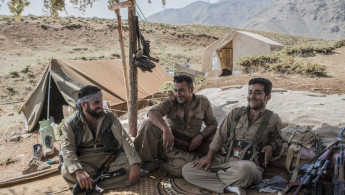Iran deploys tanks and heavy arms along borders with Iraq's Kurdistan region
The Islamic Republic of Iran has reportedly deployed a large number of troops, reinforced with tanks and heavy weaponry, across its western borders with the Iraqi Kurdistan region where bases of several Iranian Kurdish opposition parties are located, Kurdish sources said.
The move comes after Tehran recently hosted top Iraqi security and defence chiefs and warned it would conduct cross-border operations if the Iraqi and the Kurdish authorities fail to disarm the Kurdish parries.
"Iran has deployed a lot of forces in the joint frontiers, they conduct patrols in the areas and Iran threatens to attack the Iranian Kurdish opposition parties," a senior leader in one of the Iranian Kurdish opposition parties said to The New Arab, under the condition of anonymity.
"That Iran has given a short ultimatum to the Iraqi government and Kurdish authorities in the Kurdistan region to disarm us is still a rumour and such threats and military deployments are not new for us," the source added.
Ammunition and semi-heavy guns were transferred to #Mahabad.
— Hengaw Organization for Human Rights (@Hengaw_English) May 30, 2023
Tuesday, May 30, 2023#Kurdistanhttps://t.co/mgROuY0Jqi
Late in May, Iraqi National Security Advisor Qasim al-Araji headed a senior security delegation to Iran and discussed tightening the borders' security with senior Iranian officials.
Al-Araji's visit coincided also with a visit by Iraq's interior minister Abdul Amir al-Shammari. According to Iraq's state media, the minister discussed issues related to the security of the common borders between the two countries.
Iran reportedly increased pressure on the Iraqi federal government, as well as the Kurdistan Regional Government (KRG), to implement a recent security pact in regard to the frontiers between the two countries. The border security agreement was signed in March and primarily aimed at tightening the frontier with Iraq's Kurdish region, where Iranian Kurdish opposition parties have set up bases. Under the signed security deal, Iraq pledges it would not allow armed groups to use its territory in the Iraqi Kurdish region to launch any border-crossing attacks on neighbouring Iran.
The Hengaw Human Rights Organisation posted videos on Twitter reportedly documenting Iran transferring heavy weapons to the Kurdish-populated cities in Iranian Kurdistan.
The Kurdistan Democratic Party of Iran (KDPI) is an Iranian Kurdish opposition party that has waged an armed rebellion against the Iranian government since the 1979 Islamic revolution. It was founded in Iranian Kurdistan in 1946 by the late Kurdish leader Qazi Muhammad, the founder of the first modern Kurdish state of Mahabad.
Khalid Wanawsha, a member of KDPI's central committee, confirmed during a brief interview with TNA that Iran has deployed a lot of forces, reinforced by tanks and heavy weapons near the Kurdistan region borders.
"For the Islamic regime that does not respect any international norms and laws, it is not the first time that Teheran made such threats by moving forces in order to destabilise the borders and kill people," Wanawsha remarked.
"As per the Iraq-Iran security agreement, we heard it from the news agencies and neither Iraq nor the KRG has informed us about its content. Officials in the Kurdistan region have only told us to take the region's political situation into consideration," he added.
"Disarming or gathering us in camps is not accepted in any way and it is a red line for us. Meanwhile, we will regard the principles of a 'good' neighbourhood," Wanawsha stressed.
A well-informed source close to both the Iraqi and Iranian officials, speaking on condition of anonymity, told TNA last month that Tehran wanted the Iranian Kurdish groups to be entirely expelled from Iraq and sent to a third country, similar to the case of People's Mujahedin of Iran, also known as MEK (Mujahedin-e Khalq), which is an Iranian political-militant organisation opposing Iran's Islamic regime.
Iran accuses the Iranian Kurdish parties of "affiliating" with Israel, and Iran often voices concern over the alleged presence of the Israeli spy agency Mossad in the semi-autonomous Kurdish region.
The Islamic regime also accused Kurdish parties of stoking the nationwide protests, triggered by the death in custody in September of Iranian Kurdish woman Mahsa Amini.
Kurdish groups, in turn, strongly deny these accusations, saying that their activities are mainly "peaceful".





 Follow the Middle East's top stories in English at The New Arab on Google News
Follow the Middle East's top stories in English at The New Arab on Google News


